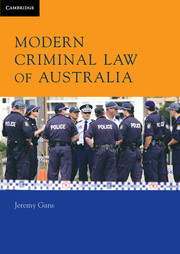7 - Standards
Summary
Introduction
The first six chapters of this book set out how questions of criminal responsibility and punishment are usually resolved under Australian law. The scope of each offence is a product of:
the offence provision itself (Chapter 1), which sets out the crime’s physical elements and may also set out further requirements
pre-trial choices (Chapter 2) about whether and how to determine whether a particular person has committed a particular crime
the general criminal law, which posits requirements beyond the offence provision, including fault elements corresponding to each conduct (Chapter 3), result (Chapter 4) and circumstance (Chapter 5) element
the court’s assessment of the seriousness of the actual offending (Chapter 6), which determines the outer boundary of what can happen to someone who admits or is found to have breached an offence provision.
This chapter explores crimes where the above system is too simplistic and alternative standards for assessing criminality apply.
The general criminal law’s core approach of defining crimes in terms of the occurrence of particular facts and defining criminals in terms of what they knew or ought to have known about those facts can be under-inclusive, over-inclusive or simply inapt. Rather, some offending can only be identified through assessing what the offender did according to a non-factual standard.
- Type
- Chapter
- Information
- Modern Criminal Law of Australia , pp. 192 - 219Publisher: Cambridge University PressPrint publication year: 2011



